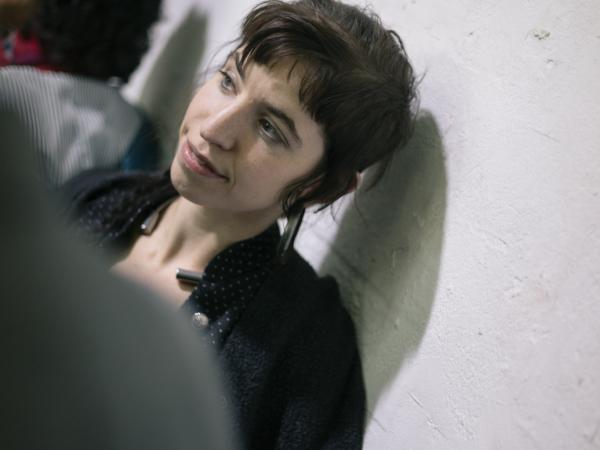Exhibition & Talks
Artist: Demian Schopf
Curators: Elena Agudio, Paz A. Guevara
Exibition: January 23rd - February 19th, 2010
Opening hours:
Monday 10 am - 3 pm, Tuesday, Wednesday, Thursday 1 pm - 6 pm
ICI Berlin Kultur Labor Institute for Cultural Inquiry:
Christinenstraße 18/19, Haus 8 D-10119 Berlin, U-Bhf. Senefelder Platz (U2)
Tel.: +49(0)304737291-10 www.ici-berlin.org
Embalmed animals in a ruinous storage of a National Museum of Natural History is the context selected by the artist Demian Schopf to stage and photograph a series of allegoric scenes. The central character is an actor with a mannequin mask, sometimes replaced by a mannequin model in order to reproduce the baroque body deformations properly. With wings, exuberant baroque costumes and medic latex gloves on hands, the figure stands combatively holding sometimes a rifle, a submachine gun, or a sickle and rake. Angelic and bellicose, these enigmatic pictures embody and invoke a subversive Latin American tradition from the colonial times.
In this photographic series the artist quotes paintings of angels and archangels from the 17th and 18th centuries’ Latin-American colonial period, often made at the School of Art in Cuzco, Perú. The quoted paintings were made in workshops by natives and “mestizos” of Latin America and were the result of the evangelist ideology that held a guided plan of education based on European models and taught by European professors.
Nevertheless, the disciples didn’t copy the theological models faithfully from their masters, rather they extended the Biblical canon of angels, incorporating apocryphal angels and translating their names; they removed the Biblical perspective and scenery and mixed baroque, mannerist, Flemish and pre-Columbian elements, realizing an act of anonymous syncretism; anonymous because the paintings weren’t signed. This is one of the reasons why the title of this series alludes to a silent revolution. The photograph titles, Asiel timor Dei; Timor Dei; and Uriel lumen Dei, refer to apocryphal angels.
Schopf updates this dynamic of cultural production, transference and reception in Latin America, re-touching the iconography of archangels and the scenes of colonial violence by substituting and adding contemporary elements: the modern media of photography replaces the painting; the mannequin figure substitutes the archangel; modern guns or a sickle and a rake replace the colonial harquebus weapon; embalmed animals take the place of the decorative flowers as an ornamental background; and the angel hands receive cold latex gloves.
Demian Schopf’s work reveals a present composed from fragments of cultural debris and contemporary imagery in which history appears to us as a dramatic mobility and discontinuous flow of cultural clashes: a “theatre of death”, as Walter Benjamin defined the baroque allegory. But also a parody and criticism, which ultimately addresses, following the neo baroque theory of the Cuban writer Severo Sarduy the painful and failed identity process of Latin America, emblematically expressed in the Schopfian mask. As an antidote, the artist offers the destructive neo baroque allegory against any glorious myth of the origin, not only of the colonial period, but also of the modern Republic, ripping away any harmonious façade from the Latin American world.
* A catalogue was published on occasion of the exhibition, with essays of Paz A. Guevara, Mauro Zanchi and an interview by Elena Agudio.
**The exhibition is accompanied by two lectures (opening and finissage):
January 23rd, 18:00 hrs.: “Demian Schopf. From Antropofagia Cultural to Postmodern Neobaroque". Talks by the artist Demian Schopf and by the curators of the exhibition.
February 19, 19:30 hrs.: “Missed Bodies” by Guilherme Bueno, director MAC Niteroi, Rio de Janeiro. Guilherme Bueno will talk about the meaning of the body in modern Brazilian culture and analyse some works of contemporary Brazilian art from the late 60' and early 70' (e.g. Cildo Meireles, Arthur Barrio, Antonio Manuel and Carlos Zilio) in which the image of death is present.







Commenti 0
Inserisci commento